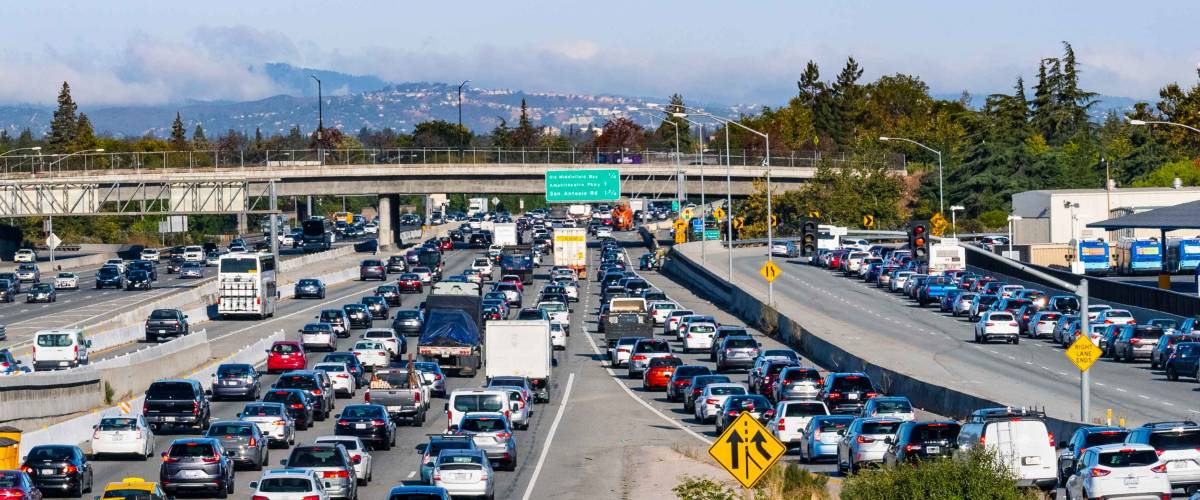Why did my car insurance premium increase?
You moved
Most people know auto insurance premiums can vary depending on the state. But even moving to a nearby ZIP code can have an effect.
Your new home may have a higher rate of auto theft. The new location may also have a higher population density, meaning there are more cars on the road, increasing the chances of an accident.
It could even be as simple as your new neighborhood having a higher rate of claims.
Your credit score dropped
The vast majority of auto insurers use credit history in their underwriting decisions. A poor credit score may cause your premiums to climb.
Only California, Hawaii and Massachusetts prohibit insurers from using your credit score as part of the underwriting process.
To keep your premiums low, learn how to improve your credit score.
More people are on the roads

Heavy morning traffic on Highway 101 going through Silicon Valley, South San Francisco Bay Area
Though a good economy is good news overall, it can have negative effects on your insurance.
More people commuting to work means more cars on the road, meaning the chances of an accident also increase.
The risk of accidents has gone up
There have never been more distractions on the road than there are today, from smartphones to complex in-car displays. Providers have noticed a correlation between increased tech use in cars and the number of accidents on the road.
There are also more uninsured drivers on the road than ever. Some areas, like the state of Florida, have a high percentage of uninsured drivers, and the costs of processing uninsured claims are higher for insurers.
This may force you into adding uninsured or underinsured motorist coverage into your policy, increasing the premiums. Twenty states and the District of Columbia even require such coverage.
Speed limits have been raised
Areas that raise their speed limits may also raise your premiums. Higher speeds mean the chances of an accident increase.
The highest speed limit in the country, 85 mph, can only be found on Texas State Highway 130.
Your area has seen wild weather
Crashes aren't the only sources of damage that need to be covered. If extreme weather has affected your area, such as a hurricane, tornado or flooding, then your auto insurance premiums may be affected.
Natural disasters typically lead to a spike in insurance claims. As such, providers are forced to raise their car insurance rates.
The odds of severe weather are increasing across the country, from flash floods to hail storms.
Your insurer's costs have gone up
For any number of economic or business reasons, it may be costlier for your insurer to run its operation compared to when you took out the policy.
The company may raise rates to cope because of the higher overhead.
Insurance fraud has become a bigger deal
You might be an Honest Abe, but others may be lying on their applications. This causes insurers to underperform due to inaccurate underwriting.
Some may only tell a little white lie and inflate the damages, while others may fabricate an entire accident.
Either way, as unfair as it may be, you may be suffering the consequences of a fraudster's actions.
You made changes to your policy
If you've added a new driver to your policy or made changes to the primary driver of the car, your insurer will have to recalculate the new risk of an accident.
Canceling or changing your home insurance can also have an effect. You might have benefited from a discount by bundling your home and auto insurance together. By cancelling the home insurance, you lose out on the bundle discount.
You may have removed a car from your policy, too, having previously benefited from having multiple cars with the same insurer.
Stop overpaying for home insurance
Home insurance is an essential expense – one that can often be pricey. You can lower your monthly recurring expenses by finding a more economical alternative for home insurance.
SmartFinancial can help you do just that. SmartFinancial’s online marketplace of vetted home insurance providers allows you to quickly shop around for rates from the country’s top insurance companies, and ensure you’re paying the lowest price possible for your home insurance.
Explore better ratesThe big one: You're not taking advantage of discounts
While a surprising number of people stick with one company their whole lives, loyalty doesn't always pay. Auto insurers offer all kinds of discounts and incentives to try to beat the competition.
A company might ask you to install an app on your phone to record your mileage or good driving habits like soft braking and acceleration. If you don't drive much, you may be able to sign on to a pay-per-mile policy.
Even if you're not interested in special discounts, it pays to check around for better quotes from other insurers. Every six months is ideal, but it's essential to look around when your current policy is coming to an end.
Use a comparison site to quickly shop for auto insurance quotes and see how much you might be overpaying.
Sponsored
Unexpected vet bills don’t have to break the bank
Life with pets is unpredictable, but there are ways to prepare for the unexpected.
Embrace Pet Insurance offers coverage for treatment of accidents, illnesses, prescriptions drugs, emergency care and more.
Plus, their optional wellness plan covers things like routine vet trips, grooming and training costs, if you want to give your pet the all-star treatment while you protect your bank account.






